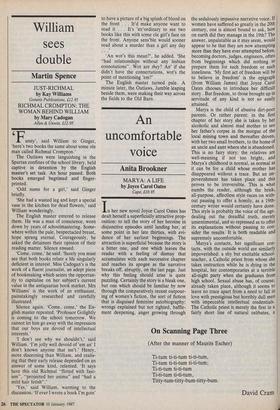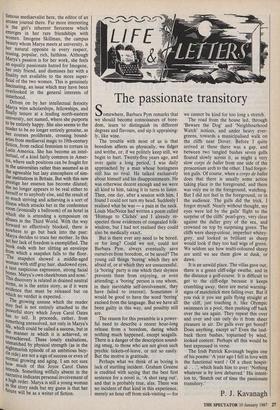An uncomfortable voice
Anita Brookner
MARYA: A LIFE by Joyce Carol Oates Cape, £10.95 In her new novel Joyce Carol Oates has dealt herself a superficially attractive prop- osition: to tell the story of her heroine in disjunctive episodes until landing her, at some point in her late thirties, with evi- dence of her earliest beginnings. The attraction is superficial because the story is a bitter one, and one which leaves the reader with a feeling of dismay that accumulates with each successive chapter and reaches its apogee as the narrative breaks off, abruptly, on the last page. Just why this feeling should arise is quite puzzling. Certainly the story is a bleak one, but one which should be familiar by now through the comparatively recent outpour- ing of women's fiction, the sort of fiction that is disguised feminine autobiography: wrongs explained but not righted, baffle- ment deepening, anger growing through
the sedulously impassive narrative voice. If women have suffered so greatly in the 20th century, one is almost bound to ask, how on earth did they manage in the 19th? The answer, unpalatable as it may seem, would appear to be that they are now attempting more than they have ever attempted before, becoming doctors, judges, engineers, often from beginnings which did nothing to prepare them for such freedom or such loneliness. 'My first act of freedom will be to believe in freedom' is the epigraph (from William James) that Joyce Carol Oates chooses to introduce her difficult story . But freedom, to those brought up in servitude of any kind is not so easily attained.
Marya is the child of abusive dirt-poor parents. Or rather parent: in the first chapter of her story she is taken by her alcoholic and almost mad mother to see her father's corpse in the morgue of the local mining town and thereafter driven, with her two small brothers, to the home of an uncle and aunt where she is abandoned. This is no fairy story: the relatives are well-meaning if not too bright, and Marya's childhood is normal, as normal as it can be for a child whose mother has disappeared without a trace. But an im- poverishment has taken place and this proves to be irreversible. This is what numbs the reader, although the brisk, all-purpose, affectless style races on with- out pausing to offer a homily, as a 19th- century writer would certainly have done. This style is probably the voice of the age, dealing out the dreadful truth, sternly unsentimental, and so repressed as to offer its explanations without pausing to con- sider the results. It is both readable and supremely uncomfortable.
Marya's contacts, her significant con- tacts, with the outside world are similarly impoverished: a shy but excitable school- teacher, a Catholic priest from whom she takes instruction while he is dying in the hospital, her contemporaries at a terrible all-night party when she graduates from high school. Sexual abuse has, of course, already taken place, although it seems to leave no trace apart from a need to fall in love with prestigious but horribly dull men with impeccable intellectual credentials. The Catholic priest is merely the first in a fairly short line of natural celibates, a famous mediaevalist here, the editor of an arcane journal there. Far more interesting is the girl's inherent fierceness which emerges in her rare friendships with women. Imogene Skillman, the campus beauty whom Marya meets at university, is her natural opposite in every respect, teasing, popular, rich, faithless. Although Marya's passion is for her work, she feels an equally passionate hatred for Imogene, her only friend, and dismisses her with a finality not available to the more super- ficial of the two women. This is genuinely fascinating, an issue which may have been overlooked in the general interests of sisterhood.
Driven on by her intellectual ferocity Marya wins scholarships, fellowships, and finally tenure at a leading north-eastern university, not named, where she purports to be entirely happy. She also seems to the reader to be no longer entirely genuine, as her courses proliferate, crossing bound- aries from mediaeval magic to 19th-century fiction, from radical feminism to torture in Latin America. She has become an intel- lectual, of a kind fairly common in Amer- ica, where such positions can be fought for In the universities rather than assumed as in the agreeable but lazy atmosphere of sim- ilar institutions in Britain. But with this new Prestige her essence has become diluted; she no longer appears to be real either to herself or to anybody else, and the result of So much striving and achieving is a sort of Illness which attacks her in the conference room (ironically a ballroom) of an hotel in Which she is attending a symposium on abuses in the Third World. With the way forward so effectively blocked, there is nowhere to go but back into the past: Marya decides to trace her mother. In this act her lack of freedom is exemplified. The book ends with her slitting an envelope fr, °m which a snapshot falls to the floor. The snapshot showed a middle-aged Woman with stiff gray hair, shadowed eyes, a taut suspicious expression, strong facial bones. Marya's own cheekbones and nose.' This discovery is related in drained neutral terms, as is the entire story, as if it were evidence that must be released but on Which no verdict is expected. -
The growing unease which the reader may feel is not entirely attached to the Powerful story which Joyce Carol Oates
has to tell. It proceeds, rather, from "Omething unresolved, not only in Marya's life, which could be called a success, but in
the manner in which it is achieved, or
overachieved. These lonely exaltations, unmatched by physical strength (as in the nightmarish episode of an ambitious bicy-
cle ride) are not a sign of success or even of normal growing and aging. I am not sure
1.1°Nv much of this Joyce Carol Oates
Intends. Something wilfully absent in the narrative indicates personal involvement of a high order. Marya is still a young woman the story ends but my guess is that her tuture will be as a writer of fiction.











































 Previous page
Previous page